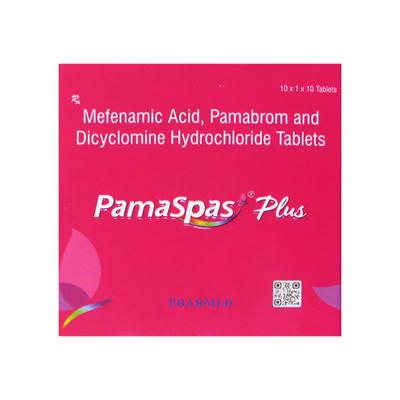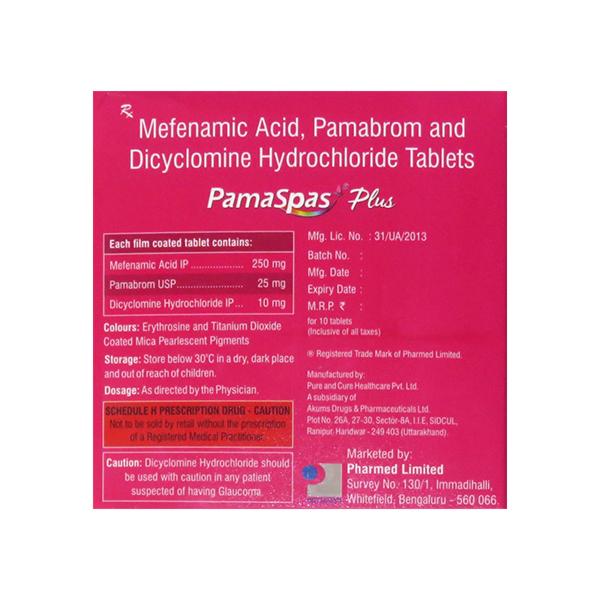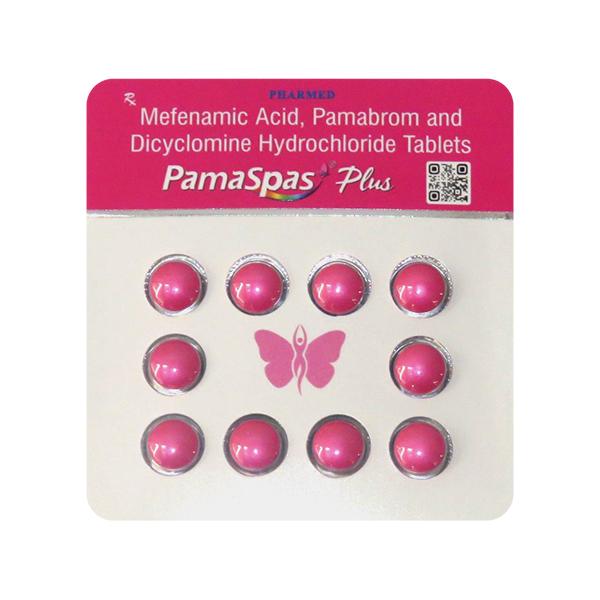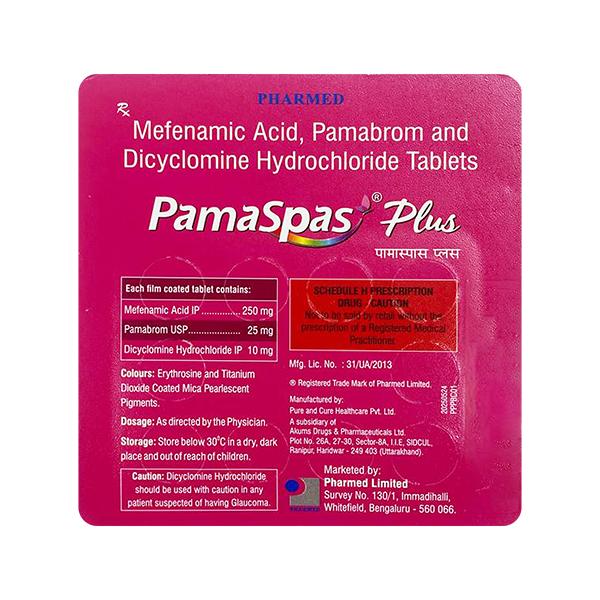

Netmeds First Membership
Quick Links
Introduction About PAMASPAS PLUS TABLET
PamaSpas Plus Tablet is a prescription medicine designed for women experiencing discomfort during their menstrual cycle. Formulated with a unique blend of active ingredients, it effectively targets both physical and emotional symptoms such as cramps, bloating, mood swings, and fatigue, associated with dysmenorrhea (painful periods) and premenstrual syndrome (PMS).
It works by relaxing smooth muscles in the uterus and gastrointestinal tract, minimizing painful contractions and spasms. Moreover, it helps reduce water retention, relieving bloating, breast tenderness, and the heavy sensation many experiences during their cycle.
Take Pamaspas plus tablet with food to avoid stomach irritation. It is usually 1-3 times depending on the intensity of menstrual symptoms and only during 3-7 days of menstruation. Do not take this medicine for more than 7 days straight without consulting your doctor. Drink plenty of water and fluid while taking this medicine to avoid dehydration.
Pamaspas plus tablet should not be used in pregnant women due to risk of delay in onset of labour. It passes in breast milk, hence should be avoided in breastfeeding women.
Before taking Pamaspas tablet, inform your doctor if you have severe liver problems, kidney problems, history of asthma, have active ulcers or bleeding in the gut, inflammatory bowel disease or block or obstruction in the intestines as a precaution.
The most common side effects of taking Pamaspas plus tablet include dry mouth, dizziness, nausea, light-headedness, gastrointestinal discomfort such as stomach pain, heartburn, headache, drowsiness or skin rash. Inform your doctor if any of these side effects trouble you.
Uses Of PAMASPAS PLUS TABLET
Pamaspas Plus is used for managing symptoms of pre-menstrual syndrome such as:
- Pain and discomfort during periods
- Painful menstruation
- Menstrual cramps
- Water retention and bloating during periods,
- Breast tenderness and heaviness
- Emotional symptoms (such as mood swings and irritability)
Key Benefits of Pamaspas Plus:
- Relieves intense menstrual cramps and abdominal pain.
- Reduces bloating and water retention, provides relief from breast tenderness, pelvic congestion, leg cramps for enhanced comfort.
- Eases mood swings, irritability, and fatigue, helping to maintain emotional balance.
- Supports overall menstrual health, making daily activities easier to manage.
Who Should Take Pamaspas Plus Tablet:
Pamaspas Plus Tablet is recommended for women seeking reliable, fast-acting relief from the multifaceted challenges of their menstrual cycle. Always consult a healthcare professional before use for the best outcomes.
Why Choose PamaSpas Plus Tablet:
Unlike standard pain relief options, Pamaspas Plus addresses a wide range of menstrual symptoms, offering holistic care and ensuring women can rise beyond pain and discomfort.
How PAMASPAS PLUS TABLET Works
Pamaspas Plus Tablet contains three active ingredients namely, dicyclomine, pamabrom, and mefenamic acid, each contributing to its effectiveness.
- Dicyclomine: This is an antispasmodic agent that relaxes the smooth muscles in the stomach and intestines, helping to reduce painful cramps and spasms.
- Pamabrom: A mild diuretic, pamabrom helps reduce water retention and bloating often associated with premenstrual syndrome (PMS) and other conditions.
- Mefenamic Acid: This is a non-steroidal anti-inflammatory drug (NSAID) that alleviates pain and inflammation by blocking the production of prostaglandins, substances in the body responsible for causing pain and swelling.
The combination of these ingredients provides relief from pain, reduce inflammation, alleviate bloating, and relax muscles, making Pamaspas Plus Tablet highly effective for managing abdominal discomfort and related symptoms.
How to use PAMASPAS PLUS TABLET
Take the tablet exactly as prescribed by your doctor. The dosage typically depends on the severity of your symptoms and your medical condition.
How To Take Pamaspas Plus Tablet:
- It is usually recommended to take the tablet after a meal to prevent stomach irritation.
- Take the tablet with a full glass of water. Do not crush, chew, or break the tablet unless instructed by your doctor.
- Pamaspas Plus Tablet is generally taken 1-3 times daily, as directed by your physician.
Precautions While Taking Pamaspas Plus Tablet
- Avoid Overdose: Stick to the prescribed dose. Taking more than recommended may lead to unwanted side effects like nausea, dizziness, or stomach upset.
- Hydration: Drink plenty of water, especially if you are experiencing bloating, as the diuretic ingredient (pamabrom) helps to reduce water retention.
When To Take Pamaspas Plus Tablet for Best Pain Relief:
- Your doctor may advice you to take this medicine till the time menstruation symptoms persist i.e., 3 to 5 days during the menses.
- Do not take this medicine for longer than 7 days at a time without consulting your doctor
Side Effects Of PAMASPAS PLUS TABLET
Like all medicine, Pamaspas plus tablet may cause certain side effects in some individuals, although not everybody gets them.
Common Side Effects of Pamaspas Plus Tablet:
- Dry mouth
- Dizziness
- Blurred vision
- Nausea
- Light-headedness
- Gastrointestinal discomfort (e.g., stomach pain, heartburn)
- Diarrhea
- Headache
- Drowsiness
- Rash
When to Seek Medical Attention:
Contact your doctor immediately if you experience any of the following side effects after taking Pamaspas plus tablet:
- Confusion, Hallucinations
- Rapid heartbeat
- Difficulty urinating
- Gastrointestinal bleeding (e.g., bloody stools, vomiting blood)
- Severe allergic reactions (e.g., swelling, severe dizziness, trouble breathing)
- Kidney problems (e.g., change in urine amount)
- Liver issues (e.g., yellowing skin/eyes, dark urine)
- Chest pain, shortness of breath, unilateral weakness, slurred speech, or swelling
Warning & Precautions
Pregnancy
Contraindicated- Pamaspas Plus Tablet is intended to manage menstrual cramps and other symptoms associated with menstruation. Therefore, this medicine is not used in pregnant women.
- There are no well controlled studies regarding the use of combination dicyclomine + mefenamic acid + pamabrom during pregnancy. However, individual studies with mefenamic acid, indicate that such pain killers may delay onset of labour in pregnant women and may cause harm to the fetus.
- Hence, Pamaspas plus tablet is not recommended for use in pregnant unless considered necessary by the physician.
Breastfeeding
ContraindicatedActive ingredients like dicyclomine and mefenamic acid present in the medicine have been shown to excrete in breast milk of lactating women. Therefore, Pamaspas plus tablet is not recommended for use in breastfeeding women.
Driving and Using Machines
Use with CautionDo not drive or handle heavy tools or machines if you experience dizziness or drowsiness after taking Pamaspas plus tablet.
Kidney
Consult your doctorPamaspas plus tablet should not be used in patients with severe kidney damage. It should be used with caution in patients with mild kidney problems. Proper dose adjustments and careful monitoring are required in such patients. Therefore, before taking pamaspas tablet, inform your doctor if you have any pre-existing kidney diseases.
Liver
Use with CautionPamaspas plus tablet should be used with caution in patients with liver problems. Therefore, before taking pamaspas tablet, inform your doctor if you have any pre-existing liver diseases.
Allergy
ContraindicatedPamaspas plus tablet should not be used in patients who have a previous history of allergy towards dicyclomine, pamabrom and mefenamic acid.
Lungs
ContraindicatedPamaspas plus tablet should not be used in patients with a history of asthma or aspirin-sensitive asthma. Therefore, inform your doctor before taking this medicine as a precaution.
Heart Disease
Use with CautionPamaspas plus tablet should be used with caution in patients with heart problems like hypertension, heart failure and edema. Therefore, before taking pamaspas tablet, inform your doctor if you have any pre-existing heart diseases.
Use In Pediatrics
Consult your doctorPamaspas plus tablet is not intended for use in children as there is no feasibility of dosage adjustments. It is advised that children under 12 years of age should use suitable alternate medicines after consulting their doctor.
Use In Geriatrics
Pamaspas plus tablet should be used with caution in elderly patients especially if they posses any kidney disease or liver disease.
Who should not take [GBNKEYWORD
Pamaspas Plus Tablet is not recommended for use in patients who have:
- active ulceration/bleeding in the gut
- chronic inflammation of upper or lower GI tract
- inflammatory bowel diseases like Crohn’s disease or irritable bowel syndrome
- recently underwent coronary artery bypass graft (CABG) surgery
- glaucoma
- myasthenia gravis (severe muscle weakness)
- paralytic ileus and intestinal atony
Safety Advice
Expert Advice for Taking Pamaspas Plus Tablet:
- Take After Meals: Always take the tablet after food to reduce the risk of stomach irritation caused by mefenamic acid.
- Follow Dosage Instructions: Use the medication strictly as prescribed by your doctor. Avoid overdosing or self-medication.
- Stay Hydrated: Drink plenty of water, especially due to the diuretic action of pamabrom, to prevent dehydration.
- Avoid Alcohol: Refrain from consuming alcohol as it can increase dizziness and stomach-related side effects.
- Inform Your Doctor: Share your medical history, especially if you have kidney or liver problems, gastrointestinal issues, or high blood pressure.
- Be Cautious During Pregnancy: Consult your doctor before using this tablet during pregnancy or while breastfeeding.
- Monitor for Side Effects: Watch for signs of allergic reactions, stomach bleeding, or severe abdominal pain. Seek medical attention if any serious symptoms occur.
Diet and Lifestyle Advice
Diet Tips To Manage Menstrual Cramps:
- Eat Anti-inflammatory Foods: Include fruits, vegetables, whole grains, nuts, seeds, and fatty fish (like salmon) to reduce inflammation and ease cramps.
- Increase Magnesium Intake: Foods like spinach, bananas, almonds, and dark chocolate can help relax muscles and alleviate cramps.
- Stay Hydrated: Drink plenty of water or herbal teas (like chamomile or ginger) to reduce bloating and relax the uterine muscles.
- Limit Caffeine and Salt: Avoid excess coffee, tea, or salty snacks, as they can worsen bloating and irritability.
- Boost Iron-Rich Foods: During periods, replenish iron with foods like lentils, beans, leafy greens, and lean meat to combat fatigue.
Exercise Tips:
- Light Cardio: Activities like walking, jogging, or cycling can increase blood flow and reduce cramps.
- Yoga: Gentle yoga poses like Child’s Pose, Cat-Cow Stretch, or Reclining Bound Angle Pose can relieve abdominal pain and relax your body.
- Stretching: Stretch your back, hips, and thighs to ease muscle tension and reduce discomfort.
- Core-Strengthening Exercises: Pilates and core-focused exercises can help reduce cramping by improving circulation to the abdomen.
Drug - Drug interaction
- Antihypertensive Medications:
- Mefenamic acid, a non-steroidal anti-inflammatory drug (NSAID), may reduce the effectiveness of antihypertensive drugs like ACE inhibitors, beta-blockers, and diuretics. This interaction can lead to elevated blood pressure.
- Anticoagulants and Antiplatelet Agents:
- Concomitant use of mefenamic acid with blood thinners (e.g., warfarin) or antiplatelet drugs (e.g., aspirin, clopidogrel) can increase the risk of bleeding.
- Other NSAIDs and Corticosteroids:
- Combining mefenamic acid with other NSAIDs or corticosteroids may heighten the risk of gastrointestinal ulcers and bleeding.
- Lithium:
- Mefenamic acid can elevate lithium levels in the blood, potentially leading to toxicity.
- Methotrexate:
- Concurrent use with mefenamic acid may increase methotrexate toxicity due to decreased renal clearance.
- Diuretics:
- Pamabrom, a mild diuretic in Pamaspas Plus, increases urine production. Using it alongside other diuretics may enhance the diuretic effect, leading to dehydration or electrolyte imbalances.
- Anticholinergic Agents:
- Dicyclomine has anticholinergic properties. When taken with other anticholinergic drugs, there may be an increase in side effects like dry mouth, blurred vision, constipation, and urinary retention.
General Recommendations:
- Consultation: Always inform your healthcare provider about all medications, supplements, and herbal products you are currently taking to assess potential interactions.
- Monitoring: Be vigilant for any unusual symptoms or side effects, especially when starting a new medication alongside Pamaspas Plus.
- Avoid Alcohol: Consuming alcohol while taking Pamaspas Plus can increase the risk of side effects such as drowsiness and dizziness.
By being aware of these interactions and following medical advice, you can use Pamaspas Plus Tablet safely and effectively.
More Information
Storage
- Store in a Cool, Dry Place: Keep the tablet in a place that is not exposed to heat or moisture. The ideal temperature is between 20°C to 25°C (68°F to 77°F).
- Avoid Direct Sunlight: Do not store the medicine in areas with direct sunlight, such as near windows or in a bathroom, as this can affect the potency of the tablet.
- Keep in Original Packaging: Leave the medicine in its original packaging or container to protect it from humidity and to maintain its integrity.
- Keep Out of Reach of Children: Store the tablet in a secure place where children cannot access it, to avoid accidental ingestion.
- Check Expiry Date: Always check the expiry date on the packaging before using the medicine. Dispose of any expired or unused medication properly.
FAQs About PAMASPAS PLUS TABLET
Q: What is Pamaspas Plus Tablet used for?
A: Pamaspas Plus Tablet is a combination medication designed for women experiencing discomfort during their menstrual cycle. It effectively targets both physical and emotional symptoms such as cramps, bloating, mood swings, and fatigue, associated with dysmenorrhea (painful periods) and premenstrual syndrome (PMS).
Q: Can we take Pamaspas Plus Tablet for menstrual cramps?
A: Yes, Pamaspas Plus Tablet is commonly used to relieve menstrual cramps. The combination of dicyclomine and mefenamic acid works effectively to alleviate pain, reduce inflammation, and relax the muscles of the abdomen, providing relief from the discomfort associated with dysmenorrhea (menstrual cramps). Pamabrom present in the medicine is a mild diuretic which eliminates bloating during period via urine.
Q: How does Pamaspas Plus Tablet help with abdominal pain?
A: Pamaspas Plus Tablet relieves abdominal pain through its three active ingredients: Dicyclomine, reduces muscle spasms in the digestive tract and abdominal area, providing relief from cramping and bloating. Pamabrom acts as a mild diuretic to reduce water retention, which can contribute to bloating and abdominal discomfort. Mefenamic acid is a nonsteroidal anti-inflammatory drug (NSAID) that reduces inflammation and pain in the abdominal region, providing relief from pain and discomfort.
Q: Can Pamaspas Plus Tablet be used for period pain?
A: Yes, Pamaspas Plus Tablet can be used for period pain (dysmenorrhea). The combination of dicyclomine and mefenamic acid targets the muscle spasms and inflammation that contribute to menstrual cramps, while pamabrom helps with any associated bloating.
Q: What are the side effects of Pamaspas Plus Tablet?
A: Some common side effects of Pamaspas Plus Tablet may include dry mouth, dizziness, blurred vision, nausea, constipation, light-headedness, stomach pain, headache, or increased urination. If you experience severe symptoms such as chest pain, difficulty breathing, or swelling, seek medical attention immediately.
Q: Is Pamaspas Plus Tablet safe to use during pregnancy?
A: Some common side effects of Pamaspas Plus Tablet may include dry mouth, dizziness, blurred vision, nausea, constipation, light-headedness, stomach pain, headache, or increased urination. If you experience severe symptoms such as chest pain, difficulty breathing, or swelling, seek medical attention immediately.
Q: Does Pamaspas Plus Tablet cause stomach pain?
A: Pamaspas Plus Tablet can cause stomach discomfort or gastritis in some individuals, particularly due to the presence of mefenamic acid, which is a nonsteroidal anti-inflammatory drug (NSAID). If you experience persistent stomach pain, it is important to consult your doctor.
Q: What is the recommended Pamaspas Plus Tablet dosage for adults?
A: The typical recommended dosage for adults is 1 tablet to be taken 2–3 times a day. However, the exact dosage may vary based on individual needs and the severity of symptoms. Always follow your doctor’s instructions regarding the appropriate dosage for your condition.
Q: What is the correct Pamaspas Plus Tablet dosage for menstrual cramps?
A: For menstrual cramps, the usual dosage is 1 tablet every 4–6 hours as needed for pain relief, but no more than 3 tablets per day. It’s important to start taking the tablet at the onset of symptoms for the best results. Always follow your doctor’s recommendations.
Q: Can I take Pamaspas Plus Tablet twice a day?
A: Yes, you can take Pamaspas Plus Tablet twice a day if recommended by your doctor. Typically, the dosage is 1 tablet 2–3 times daily, but the exact frequency may depend on the severity of your symptoms and your doctor’s guidance.
Q: What is the correct dosage of Pamaspas Plus Tablet for bloating?
A: For bloating, the recommended dosage of Pamaspas Plus Tablet is typically 1 tablet 2–3 times per day depending on the severity of symptoms. If symptoms persist or worsen, it’s important to consult your doctor.
Q: Can I take Pamaspas Plus Tablet on an empty stomach?
A: It is generally advisable to take Pamaspas Plus Tablet after meals to reduce the potential for stomach irritation, especially due to the presence of mefenamic acid. Taking it on an empty stomach may increase the risk of gastric discomfort.
Q: What should I do if I miss a dose of Pamaspas plus tablet?
A: If you miss a dose of Pamaspas Plus Tablet, take it as soon as you remember. If it is close to the time for your next dose, skip the missed dose and continue with your regular schedule. Do not take two doses at once to make up for a missed dose.
Q: How long can I use Pamaspas Plus Tablet?
A: Pamaspas Plus Tablet is usually recommended for short-term use to manage pain, cramps, or bloating. Prolonged use should be monitored by a doctor due to the risks associated with NSAIDs (mefenamic acid). Always follow your doctor’s instructions and consult them for any prolonged usage.













